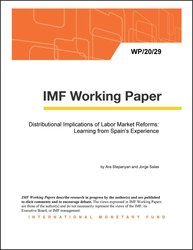
Distributional Implications of Labor Market Reforms: Learning from Spain's Experience
Spain’s structural reforms, implemented around 2012, have arguably contributed to a faster and stronger economic recovery. In particular, there is strong evidence that the 2012 labor market reforms increased wage flexibility, which helped the Spanish economy to regain competitiveness and create jobs. But the impact of these labor reforms on income inequality and social inclusion has not been analyzed much. This paper aims to shed light on this issue by employing an econometric decomposition procedure combined with the synthetic control method. The results indicate that the 2012 labor reforms have helped improve employment and income equality outcomes with no substantial impact on the overall risk of poverty. Nevertheless, the reforms appear to have induced a deterioration of average hours worked, in-work poverty, and possibly also of involuntary part-time employment.
Publication date: February 2020
ISBN: 9781513526874
$18.00
Add to Cart by clicking price of the language and format you'd like to purchase
Available Languages and Formats
| English |
Prices in red indicate formats that are not yet available but are forthcoming.
Topics covered in this book
This title contains information about the following subjects.
Click on a subject if you would like to see other titles with the same subjects.
structural reforms , income inequality , social inclusion , synthetic control method , WP , labor market reform , country-specific , labor reform , risk of poverty , pre-reform
Summary
Copyright © 2010 - 2026
Powered by:
AIDC



